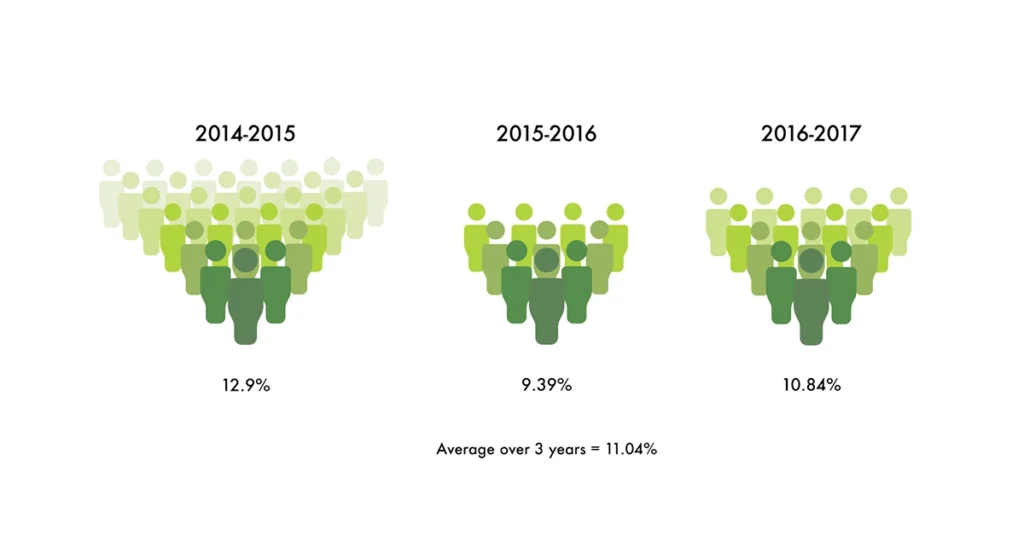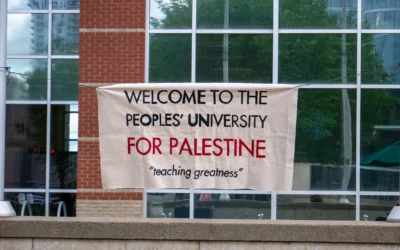From making policy to tackling student issues to voting on multi-million dollar decisions, the role of a student councillor is no joke.
Many students, however, may be unaware of the impact councillors have on their experiences at MacEwan University.
The most recent Students’ Association of MacEwan University (SAMU) student council election took place on Oct. 5 and 6, 2016. In that election, 1,585 (or 10.84 per cent) of the university’s 14,620 eligible voters cast a ballot.
Like many SAMU elections, this one was interesting. Two candidates who were critical of SAMU ran, along with a joke candidate whose campaign was far from the norm.
Hal Smith was one of the candidates who ran a campaign that took issue with some of SAMU’s actions. While he wasn’t elected, he did sit on council during the 2015-2016 term.
He says it’s important that students cast their votes, as councillors are responsible for holding their students’ union accountable – something Smith believes could be done better.
“I am very much opposed to certain things that SAMU does that I don’t believe are in students’ interests and I don’t think in any way can be justified by its own policies and bylaws,” he says.
“Things like having $14,000 parties for staff members when we only spend ($10,500) on the food bank for 19,000 students is an appalling misalignment of priorities.”
The party Smith references is the annual staff holiday party, which SAMU did, in fact, allocate 14,000 student dollars to this year.
“With the budget, there’s just underfunding of a lot of things that are of real benefit to students and overfunding of things that aren’t,” Smith says.

Smith isn’t the only person who feels this way.
“I see a lot of somewhat wasteful spending, like on extravagant events,” says councillor (and self-identified joke candidate) Jared Millions, referencing the holiday party. “Isn’t there something better this (money) can go into other than a one-night party where there’s comedians and expensive foods?”
“Something better” could include a variety of SAMU programs, like the breakfast club. Other SAMU programs include the student food bank, peer support, and clubs. Of course, significant amounts of money can only be allocated to programs if the demand for them exists.
The opinions of student councillors are one of the deciding factors for how much funding certain programs receive. They vote on the SAMU budget about halfway through their term, which is one of the reasons why Smith believes it’s important that more students cast their votes in university elections.
“It’s important to actually select people who take the time to review the documentation of these really large expenditures,” he says.
Duncan Wojtaszek, SAMU’s director of advocacy and political affairs, highlights how councillors are meant to act as a voice for the student body, particularly in regard to how some of their fees are spent.
“Let’s be honest, too: (students) pay money into the students’ association,” he says. “(Voting is) the best way to have your voice heard, in terms of ‘How do I want that money being spent?’”
While Smith says voter turnout could be a lot higher, Wojtaszek says the number of voters MacEwan sees at the polls is better than most post-secondary institutions.
“The more local an election is, voter turnout tends to be lower,” he says.
“At a municipal level where, unless there’s a major issue facing the electorate, 30 per cent isn’t that unheard of,” Wojtaszek adds. “That’s a stone’s throw away from 25 per cent, which is kind of our average.”
He notes that voter turnout for SAMU’s student executive elections is usually “solid,” and sees higher participation rates than the council elections.
Over the past three years, MacEwan’s student council elections have had an average voter turnout of 11.04 per cent, while student executive elections have had an average turnout of 20.79 per cent.
“Is (that) … enough to say, ‘That’s a serious expression of the electorate’s will?’” Wojtaszek asks. “I would say yes.”
As for those who don’t cast a ballot, Wojtaszek says one of the main reasons students don’t vote is because they don’t know enough about the candidates.
“We put a lot of the onus, frankly, on the candidates themselves,” he says. “If you want to get elected, make sure you’re getting out there and talking to people.”
“The decisions made by (the student body’s) student council do have an impact on them, and it’s done in their name,” he adds.
So, when a joke candidate gets elected and will ultimately have to make some of the big decisions associated with the councillor role, that may seem “scary” — at least, that’s how joke candidate Millions refers to the results.
Millions ran a joke campaign “because it was funny.” He earned 427 votes, which was enough to earn him a seat at the table.
“It was kind of like an inside joke that I put around the school, and the school paid for it,” he says, though he notes that he didn’t cash the cheques that were meant to fund his campaign because he felt bad about the results.
He says he didn’t want or expect to be elected, but now that he has been, he’s willing to make the required effort. He highlights advocacy for mental health accessibility as something he hopes to take on during his term.
“(Hal Smith) was actually going to probably do things … (and) actually had experience and was far more qualified than I was,” says Millions. “If he lost, I won, maybe I should kind of pick up the slack.”
While Smith was disappointed not to be elected, he says he respects the choice made by the students who voted.
“People are entitled to run whatever campaign they want,” Smith says. “It is a democracy, so students will choose what they want. And that’s what happened, and that’s perfectly legitimate.”
The democracy, however, also chose a candidate who says his campaign “(proved) that I’m an idiot.”
“The joke campaign itself was inspired by previous campaigns that were from students that seemed to have no idea how the system ran, because they were promising things they could not actually do,” Millions says, highlighting promises to negotiate with MacEwan’s food contractor, Aramark, as an example.
Smith says his previous experience as a councillor was “disappointing” for this very reason.
“I felt like it was difficult to achieve things that I believed were in students’ interest,” he says. “The majority of my peers had a different vision of what was best for the student body.”
“It was my hope to effectively improve the things that SAMU’s good at and make sure that student money is being used (in an accountable way) in other areas,” he adds.
Smith says student council is usually viewed as a team that works collaboratively, which is part of the reason why he couldn’t accomplish some of his goals.
“In policy, that’s not what council is,” he says. “Council is a governance body, and there’s a lack of accountability when you treat everyone as a team.”
“You’re there to represent student interests — not be friends with each other.”
Councillor and executive retreats make up part of the training and team building that these groups partake in. Smith cited these retreats as another example of a misguided allocation of funds.
“It’s certainly overfunded when there’s $10,000 allocated to a retreat to go out of the city, effectively, when there’s no real reason it needs to be done outside of the city,” he says, referring to the annual student executive retreat to Sylvan Lake. “It could be done in the SAMU offices at no significant expense.”
The 2016-2017 SAMU budget, which student councillors approved with their votes, allocates $19,750 to the executive training retreats.
Smith thinks it is difficult for students to become aware of this potentially frivolous spending. In fact, he says many things associated with student council and what they vote on are not always made abundantly clear, which might be why voter turnout hovers around 10 per cent.
Information about student elections can be found at samu.ca and on social media, but Smith says people might have to do some digging for certain information. He highlights how the student council meeting minutes lack voting records as an example of important information that students can’t easily gain access to.
“We’re not giving students enough information about what council does for them,” Smith says. “Students are busy. No one’s really going to take the time to look into something they’re vaguely aware of on their own, so I think the onus is on the students’ association to make sure people have the information they need to make informed decisions.”
“At the end of the day, it’s up to students to hold their association accountable for what it does and to hold their representatives accountable for what they do,” Smith says.
Student council elections take place every October. This year’s Executive Committee elections are on March 8 and 9.
Illustrations by Alley MacLean.





0 Comments